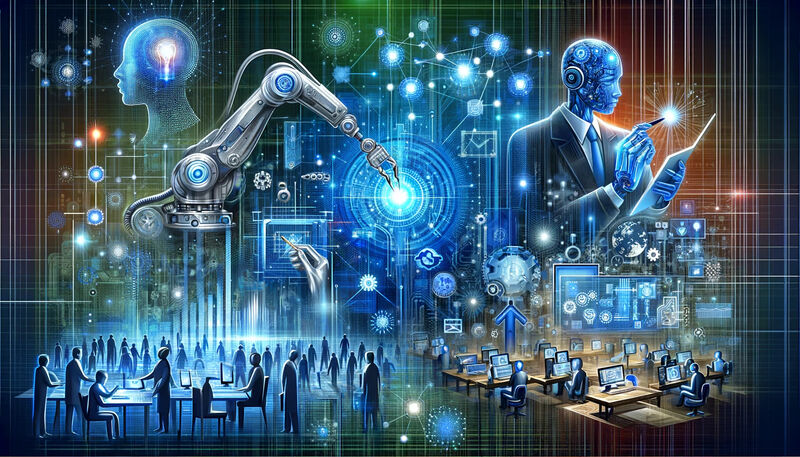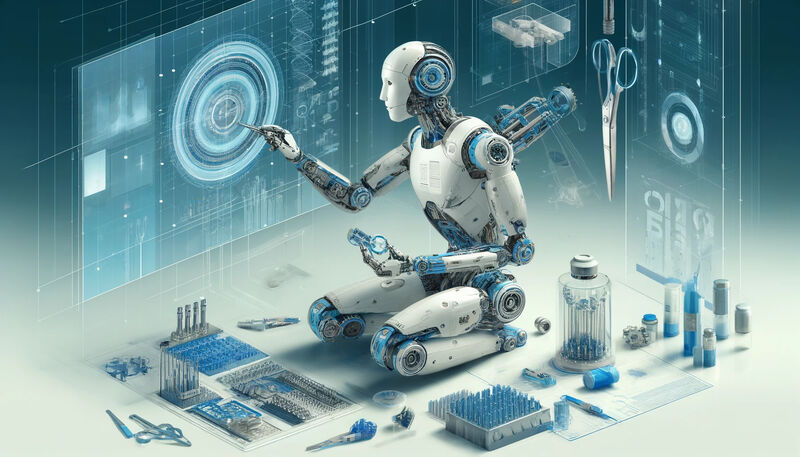The Future of Work: How AI is Transforming Industries and Employment Patterns

In the rapidly evolving digital landscape, Artificial Intelligence (AI) stands at the forefront of technological innovation, fundamentally reshaping the future of work across various industries. This transformation is not confined to traditional sectors like manufacturing and logistics but extends to professional services, healthcare, education, and beyond. This article explores the profound impact of AI on industries and employment patterns, highlighting both the opportunities and challenges that lie ahead.
AI's Impact on Industries
Manufacturing: AI-driven automation and robotics are revolutionizing the manufacturing sector, enhancing efficiency, and productivity. Smart factories, equipped with AI algorithms, can predict maintenance needs, optimize production processes, and reduce downtime, leading to significant cost savings and higher quality products.
Healthcare: In healthcare, AI applications range from diagnostic tools and patient management systems to drug discovery and personalized medicine. AI algorithms can analyze medical images with greater accuracy than human radiologists, while chatbots and virtual health assistants provide round-the-clock support to patients.
Finance: The finance industry benefits from AI through algorithmic trading, fraud detection, and personalized customer service. AI systems can analyze market trends and execute trades at speeds unattainable by humans, while machine learning models identify unusual transactions in real-time, enhancing security.
Retail: AI is transforming the retail landscape through personalized shopping experiences, inventory management, and logistics optimization. Machine learning algorithms analyze customer data to offer personalized recommendations, while AI-driven robots streamline warehouse operations and delivery processes.
The Shift in Employment Patterns
As AI automates routine tasks, the demand for certain job roles is diminishing, while the need for AI-related skills is surging. This shift necessitates a reevaluation of workforce strategies and an emphasis on reskilling and upskilling initiatives to prepare employees for the jobs of the future.
- Job Displacement: Roles that involve repetitive, predictable tasks are most at risk of automation. This includes jobs in data entry, telemarketing, and assembly line work.
- New Job Creation: AI is also creating new job opportunities in areas like AI and machine learning research, AI software development, and AI system maintenance. Additionally, as AI technologies are adopted across industries, there will be an increased need for professionals skilled in AI implementation, monitoring, and ethics.
Navigating the Transition
The transition to an AI-driven economy presents several challenges that need to be addressed to ensure a smooth adaptation:
- Skill Gap: There is a growing gap between the skills required by AI-powered industries and the skills possessed by the current workforce. Bridging this gap through education and training is crucial.
- Ethical and Social Implications: The deployment of AI raises ethical questions regarding privacy, surveillance, and decision-making. Moreover, the unequal impact of automation on different demographic groups necessitates policies that promote equitable outcomes.
- Regulatory Frameworks: Establishing regulatory frameworks that encourage innovation while protecting workers' rights and promoting job creation is essential.
The Future of Work with AI
The future of work in an AI-driven world is not predetermined but will be shaped by the actions of governments, businesses, and individuals. By embracing the opportunities presented by AI, actively addressing the challenges of transition, and fostering a culture of lifelong learning, we can harness the potential of AI to create a more efficient, innovative, and inclusive workforce.
In conclusion, AI's role in transforming industries and employment patterns is undeniable. As we navigate this transition, the focus must be on leveraging AI to enhance human capabilities, promote sustainable economic growth, and ensure a fair and equitable future for all workers.

